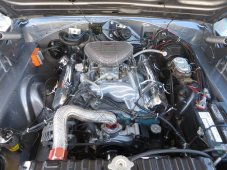Son's '69 Charger.


After reading this thread, I've erred on units of measurements. I've been using AH which is not correct. "H" stands for Henry and is a unit of inductance. I've noticed some use "S" for seconds. That's incorrect. "S" stands for Siemens.
BTW, I have no problems using Ah, as opposed to Wh when dealing with batteries.


After reading this thread, I've erred on units of measurements. I've been using AH which is not correct. "H" stands for Henry and is a unit of inductance. I've noticed some use "S" for seconds. That's incorrect. "S" stands for Siemens.
BTW, I have no problems using Ah, as opposed to Wh when dealing with batteries.


